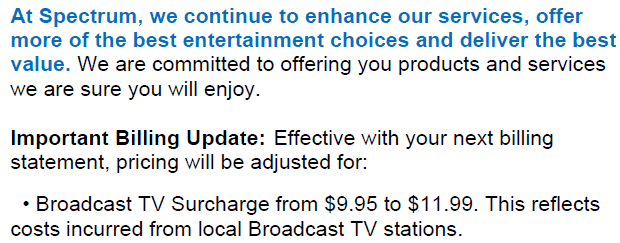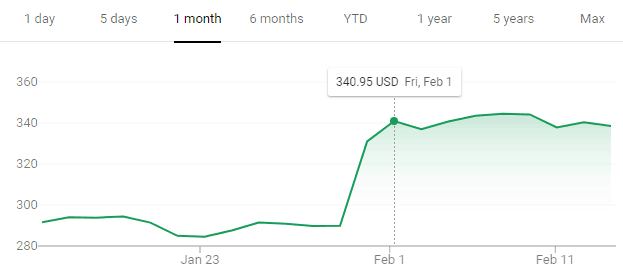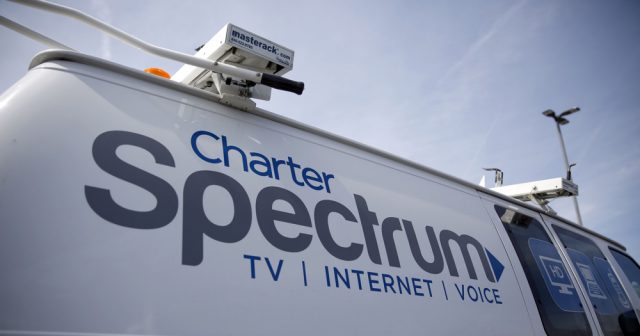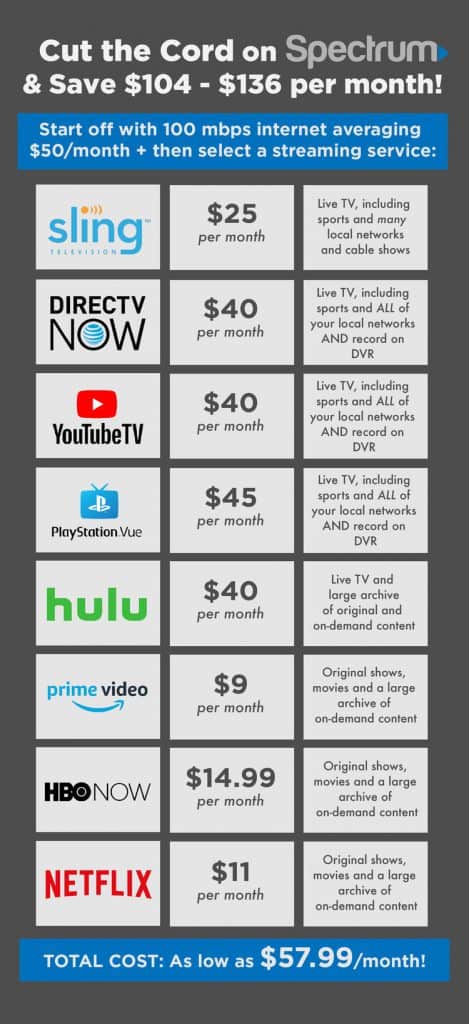 Stop the Cap! today filed comments with the N.Y. Public Service Commission urging the regulators to publicly disclose the nature of their ongoing discussions with Charter Communications.
Stop the Cap! today filed comments with the N.Y. Public Service Commission urging the regulators to publicly disclose the nature of their ongoing discussions with Charter Communications.
“Since last July’s vote revoking Charter/Spectrum’s merger approval with Time Warner Cable, the PSC has been engaged in secret talks with the cable company in what we now believe was actually an enforcement bludgeon to get the cable company to meet its commitments,” said Stop the Cap! president Phillip M. Dampier. “We suspect Charter got the message to either clean up its act and follow through on its original merger obligations, or the regulator would make good on its threat to boot the company out of New York. If Charter behaves, the Revocation Order exiling Charter from the state will probably disappear in a final settlement.”
Stop the Cap! agrees with the PSC that Charter should be held to all the merger obligations it originally agreed to, but by keeping the talks secret, consumers and lawmakers have no idea what is happening and cannot intelligently participate in the discussions.
“After multiple extensions, enough is enough,” Dampier said. “Charter also hides from public view almost all the details about its progress in reports to the Commission, making it impossible for rural New Yorkers to know when they might expect to get wired for service.”

Dampier
Stop the Cap! recommends the PSC take the discussions public and let all New Yorkers have their say about what happens next. The consumer group also reminded the PSC that there are other matters that should be considered in the discussions, including a long-lasting strike of Charter’s workers in the New York City area that is impacting the quality of service for customers.
“Anyone who has had a service problem with Spectrum knows the more experienced a technician you get, the better,” Dampier said. “Using replacement workers or third-party outsourced technicians reduces customer satisfaction and often leaves problems unresolved.”
Stop the Cap! also repeated its recommendation that any assessed penalties or fines that come from any settlement should be targeted to improving broadband service in the state.
“There are more than 75,000 New York homes and businesses that have been thrown under the bus by the New York State Broadband for All program, which assigned slightly subsidized satellite internet access for those locations, making it harder than ever for future funding opportunities for wired broadband to reach these rural residents,” Dampier said. “Most funding programs exclude areas already provided with broadband expansion funds or served by another provider, regardless of how well that provider serves their customers.”
Stop the Cap! suggests that Charter be required to expand its rural broadband commitment to reach as many of the 75,000 stranded rural locations as economically feasible.
“It is about the only solution that can cut through the red tape at this point, because these locations are usually scattered across the state, making it unlikely another provider will ever show much interest,” Dampier said. “I know it isn’t ideal to stick these homes and businesses with a cable company with a poor customer satisfaction score, but when I hear from rural unserved New Yorkers, they are desperate and cannot wait 5-10 years for something else to come along, especially if it turns out to be low-speed DSL.”
Dampier also worries about the reputation of the PSC if it suddenly announces a settlement that allows Charter/Spectrum to stay.
“Last summer, every newspaper in the state reported Charter was being thrown out of New York. Many consumers were thrilled. Then things went quiet as the public learned about extension after extension, delay after delay” Dampier said. “If the Commission suddenly announces the case is settled and Charter can stay without explaining why that is the right decision, a lot of New Yorkers are going to accuse the Commission of selling them out. Comments like that are already appearing in the docket from fed up New Yorkers who have run out of patience.”
The full text of the Stop the Cap! letter follows:

February 19, 2019
Hon. Kathleen H. Burgess
Secretary to the Commission
New York State Public Service Commission
Three Empire State Plaza
Albany, NY 12223-1350
Re: 15-01446/15-M-0388 Joint Petition of Charter Communications and Time Warner Cable for Approval of a Transfer of Control of Subsidiaries and Franchises, Pro Forma Reorganization, and Certain Financing Arrangements.
Dear Secretary Burgess,
Please share our comments with Chairman John B. Rhodes and Commissioners Gregg C. Sayre, Diane Burman, and James S. Alesi.
As a party in the proceeding whose views and recommendations were recognized by the Commission and its staff in drafting a final Merger Order granting Charter Communications its request to merge with Time Warner Cable, we remain actively interested and engaged in this transaction on behalf of consumers in New York.
As you know, most Upstate New Yorkers have just one choice for a telecommunications supplier capable of achieving the FCC’s broadband speed benchmark of 25/3 Mbps. That company is generally Charter Communications. Wireline phone companies in much of western, central, and northern New York offer DSL service to many of their customers, often at speeds well below the FCC’s definition of broadband. At our location, incumbent local exchange carrier Frontier Communications only offers up to 3.1 Mbps, a speed few consumers would consider acceptable in 2019. As a result, whatever cable company offers service in large parts of Upstate and Western N.Y. enjoys a de facto monopoly on broadband service in most of these areas.
In July, 2018 the Commission rightly found that despite multiple warnings, Charter Communications flagrantly failed to meet its obligations to New York as part of the Commission’s Merger Order. Charter Communications has failed to challenge that decision in court or offer credible evidence to rebut your conclusions. In fact, the company has largely relied on selective interpretations of the Merger Order to renege on its rural broadband expansion commitments – a key condition that was necessary for this merger to be in the public interest. While counting new passings in the urban New York City area, the company was also running television ads promoting its rural broadband expansion that we believe misled customers about Charter’s true performance of meeting its commitments to New York.
However, nearly seven months after the Commission voted to effectively expel Charter Communications from New York, the Commission and/or its staff has instead entered into in-camera negotiations with the cable company in what we can only suspect is an effort to enforce Charter’s compliance with the original Merger Order in return for a settlement eventually dispensing with the July 2018 Revocation order.
While we have no objection to the Commission’s actions seeking Charter’s compliance with its merger obligations, we remain concerned that these ongoing negotiations have remained secret for over half a year, with little ability for public interest groups, consumers, and others to provide informed input in those discussions or track their progress. Virtually all of the compliance reports submitted by Charter since the Revocation Order are also heavily redacted, leaving the public and lawmakers in the dark.
A growing number of New Yorkers are now questioning the credibility of the Commission in public comments in the docket. For example, Matt Stern on Nov. 26, 2018 (Comment 572) opined:
“Negotiations done in secret with never ending extensions are not in the best interest of the people of NYS. […] Charter has made little or no line extensions in my town in 20 years. 2 full decades. Many of us live less than 1 mile from the existing infrastructure. This is the same all over upstate NY. We are tired of excuses. If you are unable to secure these necessary infrastructure expansions then resign immediately. We are done waiting.”
Wayne Martin offered in comment 576 (Dec. 15, 2018):
“Surprise, surprise, surprise, another extension granted. The (non)actions of this commission are a slap in the face to the taxpayers of New York.”
On Dec. 18, 2018, Assemblyman Anthony Brindisi (Comment #580) asked the Commission to cease granting extensions to Charter:
“It is simply unacceptable to keep delaying Charter’s exit from New York State if they cannot meet their obligations to customers. While the company keeps getting extensions granted, I am hearing on a daily basis from Charter customers experiencing poor service and increased rates. […] The PSC’s November 23, 2018 order granting Charter an extension until January 11, 2019 to present its exit plan reads, in part, “The Compliance and Revocation Orders were designed to deal with very serious consumer issues presented by Charter’s conduct related to the company’s network expansion.” This is exactly the problem. Charter has had since July to prepare an exit strategy and delaying it any further is not in the best interests of its customers, many of whom rely on cable and internet service for their job, or to communicate with family members.”
On Feb. 6, 2019, Adam Nash complained about the Commission’s repeated extensions in Comment 614:
“[…] I’m concerned with constant extensions Time Warner has been given since July, 2018, so far they’ve been given 5. If this commission was serious on this matter there wouldn’t be this many extensions. It was stated in a article done by the Times Union News in Oct, 2018 that, “Staff believes that the commission should direct that any request granted in response to Charter’s most recent filing be final in form and that any additional time allowed must either result in a settlement agreement being presented to the commission or the cessation of settlement talks,” PSC acting general counsel John Sipos wrote in response to Charter’s request.” This statement was made when it was at its 3rd extension, NYS is at its 5th currently.”
We believe it is long past time for the Commission to publicly disclose the nature of the ongoing negotiations, specific details about the progress that has been made, and the ultimate goal of these discussions. The Commission’s July 2018 Revocation Order provoked shock headlines in the media across the state, and consumers have the expectation Charter will be leaving the state. If that ultimately does not happen, the Commission should be prepared to explain why.[1]
Our group’s view is that Charter Communications must meet each and every obligation in the Commission’s Merger Order if it wants to do business in New York and that a significant penalty is now due for failing to meet those obligations on a timely basis.
We also believe a long-standing labor dispute between the company and its unionized workforce is having an ongoing detrimental impact on the quality of service received by customers in the New York City area. We recommend the Commission undertake an investigation to see how this dispute is impacting customers.
We recommend you review our submission (item #278) of Apr. 5, 2018 recommending specific penalties against Charter that would, among other things, expand the company’s rural broadband expansion commitment even further (either in lieu of, or in addition to, financial penalties) to assist at least some of the 75,000+ unserved New York locations that are being offered substandard satellite internet access[2] from Hughes Network Systems, LLC. These locations lack wired broadband because no provider bid for financial assistance to undertake a buildout during the last round of the New NY Broadband Program, administered by the New York Broadband Program Office.[3]
These addresses are effectively stranded because programs offering public subsidy funding usually disqualify locations already provided with subsidies as duplicative.[4] But satellite internet providers cannot guarantee the speeds required to qualify as broadband, leaving those locations as a distinct disadvantage and less likely to ever get suitable broadband.[5] HughesNet also includes a very low data cap ranging from 10-50 GB.[6] In 2018, the average internet-connected home used 268 GB of data per month.[7] A penalty that includes an incentive or requirement for a private company like Charter to wire many of those locations offers a unique opportunity to resolve this serious problem. Charter offers customers at least 100 Mbps of speed and no data caps.
We appreciate the Commission and its staff’s hard work on this matter, and hope you will seriously consider our input and ideas, demonstrating once again that the New York Public Service Commission takes its obligations to the citizens of New York seriously.
Very truly yours,
Phillip M. Dampier
President and Founder
[1] “New York Moves to Kick Spectrum Out of State,” New York Times (Jul. 27, 2018) (https://www.nytimes.com/2018/07/27/nyregion/new-york-spectrum-charter-cable-broadband.html), “NY State Regulators Move to Order Charter Out of New York Over Alleged Broadband Woes,” WNBC-TV/NBC News (Jul. 27, 2018) (https://www.nbcnewyork.com/news/local/NY-PSC-Charter-New-York-489356141.html), “New York’s order kicking Spectrum cable out of state ‘pretty radical’,” The Post-Standard (Syracuse), (Jul. 27, 2018) (https://www.syracuse.com/news/index.ssf/2018/07/new_yorks_move_to_kick_spectrum_cable_out_of_state_pretty_radical.html), “PSC Orders Cable Giant Charter Out of NY,” (Albany) Times-Union, (Jul. 27, 2018) (https://www.timesunion.com/business/article/PSC-holding-special-meeting-on-Charter-Friday-13109921.php), “New York tells Spectrum Cable to get out of the state,” The Buffalo News, (Jul. 27, 2018) (https://buffalonews.com/2018/07/27/psc-wants-spectrum-cables-owner-to-get-out-of-new-york/)
[2] Satellite Broadband Remains Inferior to Wireline Broadband (VantagePoint) (Sept., 2017) (https://www.vantagepnt.com/wp-content/uploads/dlm_uploads/2018/04/vps-satellite-broadband-remains-inferior-to-wireline-broadband-090717.pdf)
[3] “Broadband Delays Prompt Frustration in Rural NY” Lockport Union-Sun & Journal (Apr. 2, 2018) (http://www.govtech.com/network/Broadband-Delays-Prompt-Frustration-in-Rural-New-York.html)
[4] “While the first round NOFA was silent on the eligibility of such overlapping projects, the second round NOFA specifically stated that areas already served by a RUS incumbent service provider were not eligible for subsequent funding.” (Selected passage from USDA’s “Broadband Initiatives Program – Pre Approval Controls Audit Report 09703-0001-32”) (March, 2013) (https://www.usda.gov/oig/webdocs/09703-0001-32.pdf)
[5] “HughesNet service is available in the contiguous U.S., Alaska and Puerto Rico. Stated speeds and uninterrupted use of service are not guaranteed. Actual speeds will likely be lower than the maximum speeds during peak hours.” (HughesNet Subscriber Agreement last revised March 10, 2017 — PART I – KEY PROVISIONS – 1.1 SPEED CLAIMS AND DISCLAIMERS.) (http://legal.hughesnet.com/SubAgree-03-16-17.cfm)
[6] “HughesNet Gen5 Fair Access Policy for the 10 GB, 20 GB, 30 GB and 50 GB Service Plans” (http://legal.hughesnet.com/FairAccessPolicyGen5.cfm)
[7] “OpenVault U.S. Household Broadband Data Consumption” (Jan. 22, 2019) (http://openvault.com/openvault-broad-based-broadband-usage-acceleration-in-2018-1tb-power-users-double-to-4-12-of-all-households/)
 In a move that clearly signals cord-cutting is taking a toll on Spectrum cable television, Charter Communications today unveiled a new streaming TV service priced to compete with “over the top (OTT)” streaming services like YouTube TV and DirecTV Now.
In a move that clearly signals cord-cutting is taking a toll on Spectrum cable television, Charter Communications today unveiled a new streaming TV service priced to compete with “over the top (OTT)” streaming services like YouTube TV and DirecTV Now. A management change at Viacom apparently included a new willingness to combat cord-cutting.
A management change at Viacom apparently included a new willingness to combat cord-cutting. The full lineup:
The full lineup:

 Subscribe
Subscribe Stop the Cap! today filed comments with the N.Y. Public Service Commission urging the regulators to publicly disclose the nature of their ongoing discussions with Charter Communications.
Stop the Cap! today filed comments with the N.Y. Public Service Commission urging the regulators to publicly disclose the nature of their ongoing discussions with Charter Communications.

 Although Spectrum Cable customers will face higher cable TV bills starting next month, the company’s shareholders are delighted, boosting Charter’s stock price more than $50 a share on the news.
Although Spectrum Cable customers will face higher cable TV bills starting next month, the company’s shareholders are delighted, boosting Charter’s stock price more than $50 a share on the news.


 Charter is expecting it can distribute more of its revenue to shareholders, share buybacks, and debt payments as a result of the completion of its all-digital conversion project, which eliminated analog television signals from cable systems to make more room for revenue-enhancing internet service. The company also gets to lease more set-top boxes to customers seeking to view digital television signals on older analog TV sets.
Charter is expecting it can distribute more of its revenue to shareholders, share buybacks, and debt payments as a result of the completion of its all-digital conversion project, which eliminated analog television signals from cable systems to make more room for revenue-enhancing internet service. The company also gets to lease more set-top boxes to customers seeking to view digital television signals on older analog TV sets.

